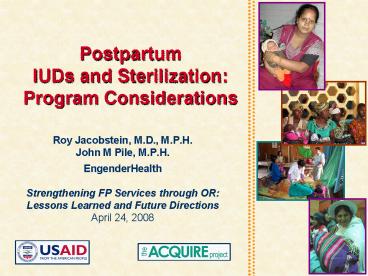Postpartum IUDs and Sterilization: Program Considerations - PowerPoint PPT Presentation
1 / 11
Title:
Postpartum IUDs and Sterilization: Program Considerations
Description:
... (AMTSL) Non-physicians Stand alone curriculum Expanded discussion on Counseling Infection prevention Key Messages About PP IUD & Sterilization WHO MEC ... – PowerPoint PPT presentation
Number of Views:116
Avg rating:3.0/5.0
Title: Postpartum IUDs and Sterilization: Program Considerations
1
Postpartum IUDs and Sterilization Program
Considerations
- Roy Jacobstein, M.D., M.P.H.
- John M Pile, M.P.H.
- EngenderHealth
- Strengthening FP Services through OR
- Lessons Learned and Future DirectionsApril 24,
2008
2
Setting the StagePostpartum IUDs and
Sterilization
- Need
- 90 women first year postpartum want to delay
another pregnancy at least two years or avoid
future pregnancies altogether Ross Winfrey
2001 - Opportunity
- 81 women delivering received antenatal care
- 54 deliveries occur in health facility
- 36 countries with DHS in past 5 years,
StatCompiler Macro. 2008 - Good choice for women and programs
3
Initiating LAPMs in the Extended Postpartum
Period (Delivery1 Year)
Delivery 48 hr 1 week
4 weeks 6 weeks 6 months
9 months 12 months
IUD (Copper-releasing)
IUD
(Progestin-releasing)
All Women Non-breast-feeding
Women Breast-feeding Women
FEMALE
STERILIZATION
(Minilaparotomy)
FEMALE STERILIZATION
(Laparoscopy)
VASECTOMY (No-scalpel or conventional)
IMPLANTS
IMPLANTS
4
Sine Qua Non of PP IUD Sterilization Services
The Fundamentals of Care (FoC)
- Fundamentals of Care
- Free and informed choice
- Medical safety
- Ongoing quality improvement
- FOC may be fundamental but theyre not easy
5
Advantages Why Consider IUDs Sterilization
Postpartum?
- Cost effective to programs
- Immediate postplacental IUD 2.14-3.37
- Before discharge 2.79-3.97
- Interval 3.75-4.70
- Hubacher et al 1992 Sahin et al. 1994
- Convenient to clients
- Client not at risk of pregnancy
- Less (perceived) side effects
6
Issues Challenges to PP IUD and Sterilization
Training Services
- Need adequate caseloads to develop competence
- Need to ensure readiness of delivery/labor wards
- Experienced trainers
- Knowledgeable staff
- Specialized supplies
- Appropriate infection prevention practices in
place - Need to optimize structure of work
- reward not punish providers of IUDs and FS
- structural/system integration (e.g., with
antenatal services MCH/well-baby services
in-reach)
7
Method-Specific Training Service Issues
Challenges
- Sterilization
- Permanent
- Need to ensure practices that prevent coercion or
any violation of free and informed choice - Need to minimize regret
- IUD
- Need realistic model of PP uterus (for humanistic
training) - Need PPIUD training video
- Want to minimize risk of expulsion
8
Issues Challenges to Postpartum IUD Expulsion
- Higher PP than interval
- Lower post-placental than immediate
- PP IUD Still highly effective beneficial, for
all timing categories MEC / SPR Revision
Meeting, 4-08, WHO Systematic Review of Timing of
Postpartum IUDs - immediate postplacental insertion (lt 10 min)
appears to decrease the risk for expulsion
compared to other postpartum time intervals,
although immediate insertion carries a higher
risk of expulsion compared to interval
insertions - Expulsion rates can be reduced (by placement high
in uterine fundus, by trained/skilled provider,
post-placental provision)
9
PP IUD Training Manual/Curriculum Being Updated
- Reflects WHO 2004 MEC recommendations and 2008
MEC SPR - Incorporates proven best practices key clinical
programmatic issues, e.g. - Active Mgt Third Stage of Labor (AMTSL)
- Non-physicians
- Stand alone curriculum
- Expanded discussion on
- Counseling
- Infection prevention
10
Key Messages About PP IUD Sterilization
- WHO MEC Category 1 for PPIUD, Category A for FS
- I.e., one or other can be used by most women in
almost all categories (e.g., lower parity/higher
parity younger/older HIV- or HIV or AIDS,
clinically well) - PP IUD FS are safe, highly effective,
convenient, programmatically feasible and
worthwhile - Feasible for PPIUD to be provided by mid-level
(as well as higher level) health care providers,
and FS by Clinical Officers - Feasible to provide PP IUD at PHC facilities
11
Key Messages About PP IUD Sterilization
- Women avail themselves of PP IUD sterilization
when services made available - Chicago study46 of women who requested
postpartum sterilization do not undergo the
procedure ARDMS 2008 - Ankara study89 women planned to start FP within
6 months, however only 52 using at 6 months
Pile et al, 1993 - Factors limiting access
- Delays in operating room time
- Staff not available
- Commodity not available































